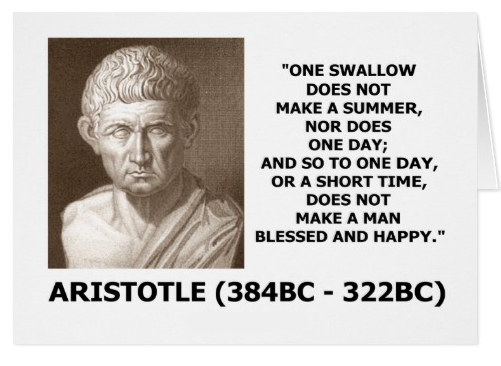We post news and comment on federal criminal justice issues, focused primarily on trial and post-conviction matters, legislative initiatives, and sentencing issues.
ONE SWALLOW DOES NOT A SUMMER MAKE
 When Aristotle observed that sighting one returning swallow did not mean that summer was here, was talking about how a single event – often an aberration – does not constitute a trend. So it is in law.
When Aristotle observed that sighting one returning swallow did not mean that summer was here, was talking about how a single event – often an aberration – does not constitute a trend. So it is in law.
Appeals courts are staffed with humans, and humans make mistakes. Eight years ago, the 6th Circuit held that an inmate whose was eligible for a sentence reduction under 18 U.S.C. 3582(c)(2) but whose judge decided not to grant some or all of the reduction could not appeal. In United States v. Bowers, the Circuit held that the appeal statute, 18 USC 3742, tightly limited its jurisdiction to entertain an appeal of the district court’s denial of a 3582(c)(2) sentence-reduction motion. It lacked jurisdiction to review a sentence reduction decision simply because the defendant thought it was unreasonable.
When Bill Reid asked his judge to apply the 2014 2-level drug reduction to his sentence, the district court refused, citing two disciplinary infractions Bill had gotten during his prison stint for possession of drugs and tobacco. The judge said the two disciplinary reports proved Bill had not “gained respect for the law.”
Bill appealed, argued the district court had not provided a “reasoned basis” for denial, and that it “misapplied the governing statutory criteria” to the facts of his case. He cited two cases the Circuit had decided after the 2010 Bowers decision in which it had considered the identical arguments.
 Yeah, the Circuit admitted last week, we did do that. But “those decisions are not faithful to Bowers. At their core, Reid’s arguments are challenges to the procedural and substantive reasonableness of the outcome of his Sec. 3582(c)(2) sentence-reduction proceeding… But Bowers explicitly held that we do not have jurisdiction under Sec. 3742(a)(1) to consider such arguments in appeals from the denial of sentence-reduction motions.”
Yeah, the Circuit admitted last week, we did do that. But “those decisions are not faithful to Bowers. At their core, Reid’s arguments are challenges to the procedural and substantive reasonableness of the outcome of his Sec. 3582(c)(2) sentence-reduction proceeding… But Bowers explicitly held that we do not have jurisdiction under Sec. 3742(a)(1) to consider such arguments in appeals from the denial of sentence-reduction motions.”
“We are obliged,” the Court held, “to follow the explicit holding of Bowers, later cases notwithstanding… And pursuant to Bowers, we do not possess jurisdiction to entertain Reid’s Booker unreasonableness arguments.”
United States v. Reid, Case No. 17-5451 (6th Cir. Apr. 23, 2018)
– Thomas L. Root

